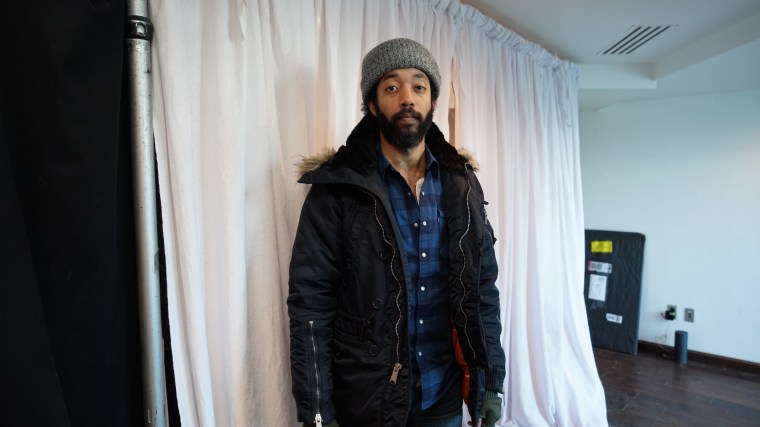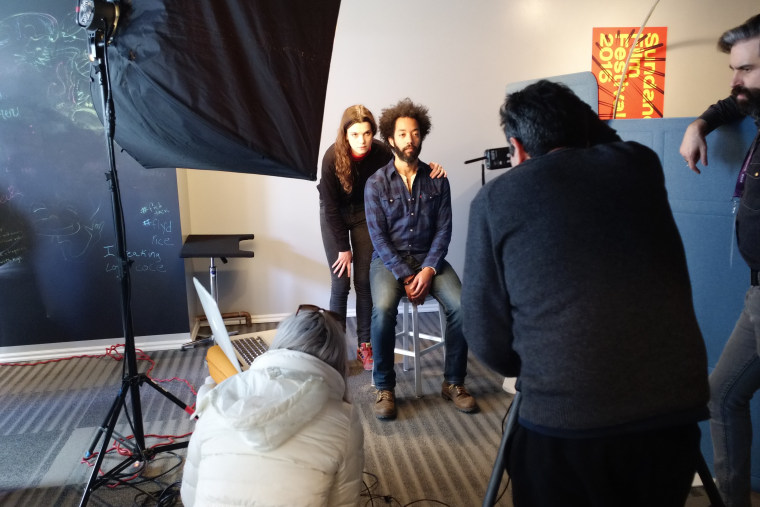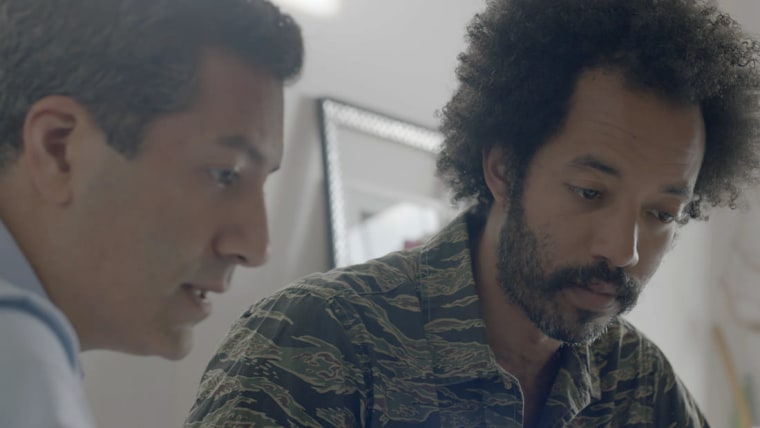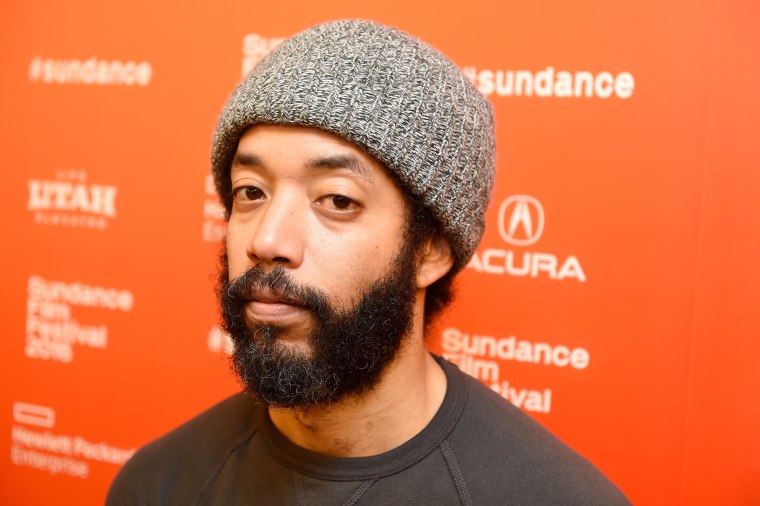It was just over three years ago that comedian Wyatt Cenac left his position as a correspondent on the Daily Show, where a dustup with host Jon Stewart may or may not have contributed to his decision to exit. Since then he's kept a relatively low profile, performing standup across the country. But he’s stepped back into the spotlight this week with the debut of a new movie at the Sundance Film Festival.
In the faux documentary "Jacqueline (Argentine)", Cenac plays a filmmaker pursuing a mysterious French woman who claims she’s prepared to leak government secrets on a scale worthy of Edward Snowden. In the Sundance catalogue festival programmers praise Cenac for his “drily witty performance.”
NBCBLK sat down with Cenac in Park City, Utah to talk about the film, The Daily Show, Hollywood’s diversity problem and Donald Trump.

NBCBLK: Have you been to Sundance before?
Wyatt Cenac: This is my first time. I’ve had other opportunities to go. I’ve had other things here but never gone… I had friends who were here [earlier in the festival]. It sounded insane and didn’t necessarily make it feel like a place I wanted to come.
NBCBLK: How did you become involved with Jacqueline (Argentine)?
WC: The director Bernardo [Britto] reached out to me. He’d been interested in me for the role and then I did a comedy show and he came and we grabbed a drink [afterward]. Getting to hear how passionate he was about this film made me much more interested in reading the script and also getting to talk to him and realizing, “Okay, yeah, he’s a nice guy and we get along.” Those are the things you would hope for in a situation like making a film, that you’re surrounded by people that you enjoy being around because, yeah, you’re going to spend 12 plus hours with them a day. You better like ‘em.
NBCBLK: You’re used to performing live and doing live television. Was is it like for you to shoot a film?
WC: I don’t do enough movies that I can call it a career. It really is sort of like summer jobs or something like that. It’s very much like holiday work as far as, okay, I do it and I’m there for two weeks and hopefully am working really hard and then it’s done and I kind of go back to what I was doing before.
NBCBLK: Your character in Jacqueline (Argentine) is a journalist who thinks he’s onto a potentially career-defining story.
WC: I think he is that person looking for a break. Whether that’s someone in the film industry or whether that’s a reporter, an inventor — everyone’s looking for that big thing and there is a sort of desperation the longer you go without it… He is a man who is questioning his own faith in himself and in his abilities and here is this sort of “come to Jesus” moment for him — this story might be the thing that makes all of this worthwhile. And is this desire for this to be my big break clouding my [character’s] judgment? I’m traveling all the way to Argentina to talk to a woman that is being incredibly mysterious, but captivating in that mystery.
NBCBLK: Do you see The Daily Show as having been your big break?
WC: I don’t know if I’ve had that yet. I mean I’m not in a position where I have the creative autonomy to do anything I want to do. I would assume that’s the hope of a big break, that you have a buffet of options in front of you. I think if anything maybe it’s helped me get into the restaurant but I still don’t have a table yet.
it feels like the narrative has been turned into “black people versus Hollywood.” And it’s a larger thing than that.
NBCBLK: Assuming you can get to that place of autonomy eventually, where you have the buffet of career options, what would you want to be doing?
WC: I still love television and I would love to make and create my own things and part of why I left The Daily Show was to focus on trying to do that more. And that’s still the goal.
NBCBLK: Quite a while after you left the Daily Show you did an interview with Marc Maron. You mentioned an incident, if that’s that word, where you and Jon Stewart had gotten into an argument having to with a Herman Cain impression he did. That really got picked up by the media. What did you conclude from the way that story gained traction?
WC: For almost five years I worked on a show where we kind of looked at the way the news cycle becomes this sort of feeding frenzy for the story that may not be the best story but the story that gets the most views. And in that [interview with Maron] I was talking about something that was a real and personal thing that got cannibalized into something that could be click bait. And so I think if anything it was for me this almost like ‘oh right, this is what happens.’ It wasn’t a thing I was talking about with the thought that it would hit the news cycle. The amount of people that actually listened to that Maron interview versus the people who just kind of sort of just took an opinion without actually hearing the word, it felt [like] people were just kind of making a headline versus actually listening to what I was talking about [laughs]. It felt like, yeah, there’s a drama that is trying to be created here that didn’t exist.
If there was a takeaway it was finding myself in a situation where there is an outside force trying to create a drama and trying to create something out of what to me was nothing.

NBCBLK: There has been a lot of talk at Sundance about the debate going on in Hollywood over diversity, which came out of the reaction to the Academy Award nominations.
WC: It’s very weird to be having a conversation about inclusion in a place as exclusive as Sundance. [laughs] There is a strange aspect of that but I think it points to a larger thing — that as an industry there are a lot of institutional things that have been set up that make it harder for outside voices to be heard and to be considered.
As it relates to the Oscars it feels like the narrative has been turned into “black people versus Hollywood.” And it’s a larger thing than that. This is something that I think affects all minorities. You look at a film like Tangerine [the comedy about trans people of color] that did not get considered and nobody really talked about that. It’s like, how many Oscar voters actually watched every movie that came through?
There is a virus that maybe needs to be addressed as far as teaching tolerance and just educating people in a way that they are not so sort of “dog whistle” — just immediately jumping toward the most hateful things.
I think there’s a larger conversation that is about race in America and not just race but gender, sexuality in America, inequality in America. As it relates to the Oscars I think the larger issue isn’t necessarily was Creed snubbed, it’s who the f--k are the voters and are they doing their due diligence as voters? Because if not they need to lose that privilege.
That’s the bigger issue — that you have these people who are claiming to be these critical viewers who can say what is good and what is not. But if they’re not actually viewing everything critically, well then f--k you. If you’re not actually going to do the due diligence then you shouldn’t have a vote. That would be like me voting for the NHL All-star Game and I don’t watch hockey.
NBCBLK: You are known for your astute political observations. What do you make of the Republican campaign for President?
WC: We can sit here and demonize this candidate or that candidate as far as their political views. Everything that’s coming out of Donald Trump’s mouth is hateful and horrific but people like it and to me it speaks to something that is larger than who is the President. It speaks to this idea that in our society this is still something that is being digested as good and there are still enough people that like what he’s saying and that’s distressing. But it also seems to suggest, okay, there is a virus that maybe needs to be addressed as far as teaching tolerance and just educating people in a way that they are not so sort of “dog whistle” — just immediately jumping toward the most hateful things.
If we truly are a society wanting to be better — the fact that there are so many people that still want the horrible thing, we have failed over the last few decades as far as spreading that idea of inclusion and tolerance throughout the country. Whoever the President is isn’t going to fix that. The virus is a lot deeper in the body. That’s something that maybe we need to address.
[this interview has been edited and condensed for clarity]

